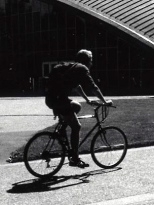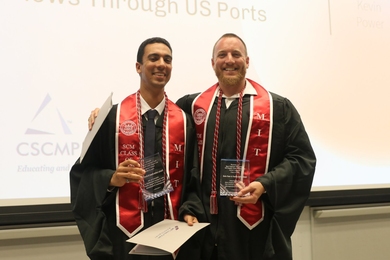MIT students soon may be pedaling all over Boston on bicycles borrowed from a high-tech bike-share program similar to Zipcar.
Bike-share programs aren't new, but TechBikes, a program designed by Atif Qadir (S.B. 2004), promises an MIT difference: better technology.
Qadir and his team have designed a prototype for an automated system that will dispense a bike lock key with a swipe of an MIT ID card. Bikes locked at several "intelligent bike rack" stations throughout campus will be dispensed and returned at the user's convenience.
Although the automated system isn't ready yet, East Campus has been running a more modest TechBikes pilot program for the past year. Greater automation should allow the program to go beyond the dorms, said graduate student Daniel Shen, who runs the East Campus testing site. Shen said he hopes to see TechBikes spread campuswide.
While preparing a funding proposal in 2004, Qadir identified several reasons MIT is ideal for a bike-share program.
The relatively flat, spread-out campus is perfect for biking, said Qadir in his proposal. Qadir also said he polled hundreds of students and found cost was the No. 1 reason cited for not having a bike. More than 70 percent of students without bikes said they wanted one, he found.
The 20 current East Campus TechBike members have access to three bicycles and four helmets. Upon registration, each participant receives an official copy of "Bicycle Laws of Massachusetts and Cambridge" as well as a brief lesson in tire maintenance. The program is free, open to new members and runs March through November. Members can use the bikes to go into Boston, take long rides or just to travel across campus. For now, the bikes must be returned East Campus after use.
The three bikes currently in circulation were purchased used after TechBikes received a developmental grant in spring 2004 from the IDEAS Competition. Eventually, TechBikes plans to have a fleet of bicycles, albeit fewer than the 50 that were originally proposed. "We've found that less bikes and maintenance than originally anticipated were needed," Shen said.
TechBikes is not the first program of its kind at MIT or elsewhere. Amsterdam and Toronto have successful bike-share programs, but the record in the United States is spotty. "Bike-share programs seem to have a romantic feel to them that draws people to get them started, but unfortunately they die off due to theft or loss of the original organizers," said Shen.
So far, TechBikes has beaten the odds by keeping close tabs on the bikes and the participants. Members accept responsibility for any lost, damaged or stolen bike and help maintain the bicycles.
And, theft has not been a problem for the pilot program. "Past programs had more trust," said Shen. "Unfortunately, we just cannot afford to do that." Each bike is well accounted for, and the students who take them out must register with the program.
Additionally, TechBikes equipment is designed to foil would-be thieves. "We make sure the bikes are kind of ugly," Shen said with a laugh.
Organizers are hoping the program will generate more interest-and funds-in the year ahead.
"We are trying to do this frugally," said Shen. "Hopefully it will go somewhere."






